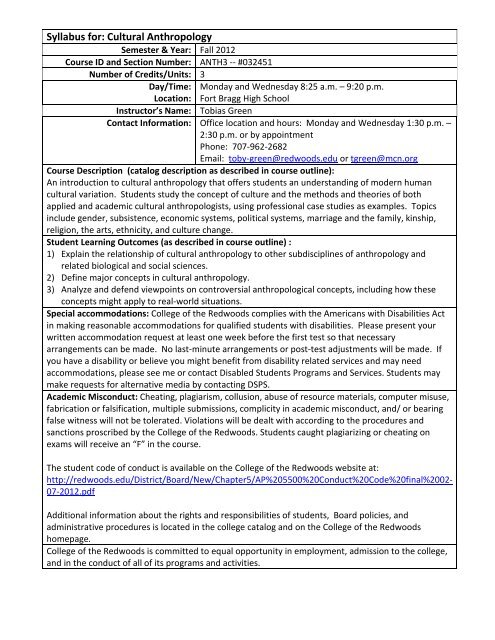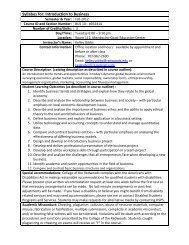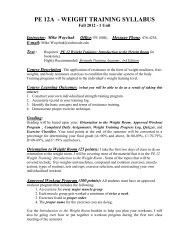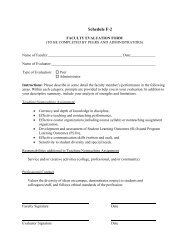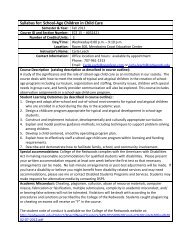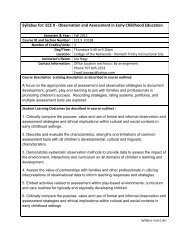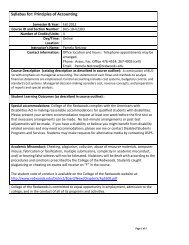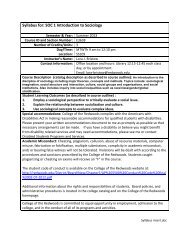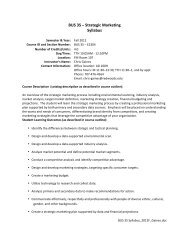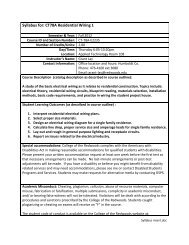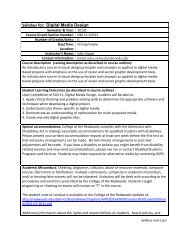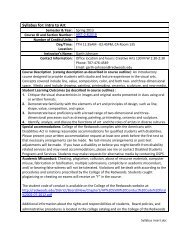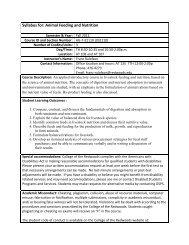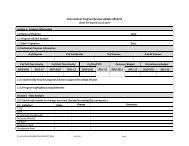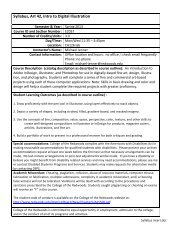Syllabus for: Cultural Anthropology - College of the Redwoods
Syllabus for: Cultural Anthropology - College of the Redwoods
Syllabus for: Cultural Anthropology - College of the Redwoods
Create successful ePaper yourself
Turn your PDF publications into a flip-book with our unique Google optimized e-Paper software.
<strong>Syllabus</strong> <strong>for</strong>: <strong>Cultural</strong> <strong>Anthropology</strong>Semester & Year: Fall 2012Course ID and Section Number: ANTH3 -- #032451Number <strong>of</strong> Credits/Units: 3Day/Time: Monday and Wednesday 8:25 a.m. – 9:20 p.m.Location: Fort Bragg High SchoolInstructor’s Name: Tobias GreenContact In<strong>for</strong>mation: Office location and hours: Monday and Wednesday 1:30 p.m. –2:30 p.m. or by appointmentPhone: 707-962-2682Email: toby-green@redwoods.edu or tgreen@mcn.orgCourse Description (catalog description as described in course outline):An introduction to cultural anthropology that <strong>of</strong>fers students an understanding <strong>of</strong> modern humancultural variation. Students study <strong>the</strong> concept <strong>of</strong> culture and <strong>the</strong> methods and <strong>the</strong>ories <strong>of</strong> bothapplied and academic cultural anthropologists, using pr<strong>of</strong>essional case studies as examples. Topicsinclude gender, subsistence, economic systems, political systems, marriage and <strong>the</strong> family, kinship,religion, <strong>the</strong> arts, ethnicity, and culture change.Student Learning Outcomes (as described in course outline) :1) Explain <strong>the</strong> relationship <strong>of</strong> cultural anthropology to o<strong>the</strong>r subdisciplines <strong>of</strong> anthropology andrelated biological and social sciences.2) Define major concepts in cultural anthropology.3) Analyze and defend viewpoints on controversial anthropological concepts, including how <strong>the</strong>seconcepts might apply to real-world situations.Special accommodations: <strong>College</strong> <strong>of</strong> <strong>the</strong> <strong>Redwoods</strong> complies with <strong>the</strong> Americans with Disabilities Actin making reasonable accommodations <strong>for</strong> qualified students with disabilities. Please present yourwritten accommodation request at least one week be<strong>for</strong>e <strong>the</strong> first test so that necessaryarrangements can be made. No last-minute arrangements or post-test adjustments will be made. Ifyou have a disability or believe you might benefit from disability related services and may needaccommodations, please see me or contact Disabled Students Programs and Services. Students maymake requests <strong>for</strong> alternative media by contacting DSPS.Academic Misconduct: Cheating, plagiarism, collusion, abuse <strong>of</strong> resource materials, computer misuse,fabrication or falsification, multiple submissions, complicity in academic misconduct, and/ or bearingfalse witness will not be tolerated. Violations will be dealt with according to <strong>the</strong> procedures andsanctions proscribed by <strong>the</strong> <strong>College</strong> <strong>of</strong> <strong>the</strong> <strong>Redwoods</strong>. Students caught plagiarizing or cheating onexams will receive an “F” in <strong>the</strong> course.The student code <strong>of</strong> conduct is available on <strong>the</strong> <strong>College</strong> <strong>of</strong> <strong>the</strong> <strong>Redwoods</strong> website at:http://redwoods.edu/District/Board/New/Chapter5/AP%205500%20Conduct%20Code%20final%2002-07-2012.pdfAdditional in<strong>for</strong>mation about <strong>the</strong> rights and responsibilities <strong>of</strong> students, Board policies, andadministrative procedures is located in <strong>the</strong> college catalog and on <strong>the</strong> <strong>College</strong> <strong>of</strong> <strong>the</strong> <strong>Redwoods</strong>homepage.<strong>College</strong> <strong>of</strong> <strong>the</strong> <strong>Redwoods</strong> is committed to equal opportunity in employment, admission to <strong>the</strong> college,and in <strong>the</strong> conduct <strong>of</strong> all <strong>of</strong> its programs and activities.
QuizzesYou MUST complete <strong>the</strong> weekly online reading quiz by 8:00 AM on each Monday morning.Academic HonestyPlagiarism (presenting some else’s work as your own) and cheating (receiving unauthorized assistance) aredishonest practices and will not be tolerated in this class. CR’s policy provides severe penalties in <strong>the</strong>se cases, fromwarning to permanent suspension. If you have any questions or doubts about this issue, ask <strong>the</strong> instructor.Expectations:Students will attend every class and be prepared to discuss <strong>the</strong> assigned readings. ALL written assignments must beclearly written in paragraphs <strong>of</strong> complete sentences. Assignments must be typed in 12-point Times Roman fontwith 1” margins on all sides. Late assignments will be penalized one grade increment <strong>for</strong> each day (includingweekends) that <strong>the</strong>y are late.Projects:Film Culture Project: You will view a film which introduces you to a culture very different from contemporarymainstream US, analyze it from an anthropological point <strong>of</strong> view, and write a brief ethnography. More specificinstructions will be furnished by <strong>the</strong> pr<strong>of</strong>essor.Kinship Analysis: You will interview an in<strong>for</strong>mant (not related to you by blood) regarding his or her descent group,and report on your findings with a kinship diagram and an analytical description. Your diagram will use conventionalethnographic symbols, and you may use additional resources <strong>for</strong> in<strong>for</strong>mation. More specific instructions will befurnished by <strong>the</strong> pr<strong>of</strong>essor.Movies/Videos:Movies and videos shown in class are part <strong>of</strong> <strong>the</strong> curriculum. Attendance in classes where <strong>the</strong>se are shown isrequired, as <strong>for</strong> any o<strong>the</strong>r class meeting. Discussions during <strong>the</strong>se class meetings will include material which youwill need <strong>for</strong> papers and examinations.Submitting <strong>the</strong> Projects:Your projects will be submitted in two <strong>for</strong>mats. Submit both a paper and an electronic version by <strong>the</strong> beginning <strong>of</strong><strong>the</strong> period on <strong>the</strong> due dates.Help:The Learning Assistance Center on campus is an excellent source <strong>of</strong> editorial help, both be<strong>for</strong>e and after submittingwork. Students will receive review sheets be<strong>for</strong>e each exam. In addition, English faculty are available to students<strong>for</strong> several hours each week <strong>for</strong> focused help on building writing skills. Students receive from ½ to 1 credit <strong>for</strong> thisby registering <strong>for</strong> English 152.Benefits:Creating response papers and projects will give you <strong>the</strong> opportunity to explore some <strong>of</strong> <strong>the</strong> detail <strong>of</strong> anthropologyand specific cultures, which is <strong>of</strong>ten <strong>the</strong> most interesting part <strong>of</strong> <strong>the</strong> subject. It will also introduce you to <strong>the</strong>process <strong>of</strong> understanding culture by interpreting anthropological data. Finally, it will help you develop <strong>the</strong> skills youneed to succeed on <strong>the</strong> exams, in particular <strong>the</strong> critical thinking skill <strong>of</strong> putting particular objects or accounts <strong>of</strong>events in <strong>the</strong> broader context <strong>of</strong> cultural relativism.MORE:See <strong>the</strong> back page <strong>of</strong> <strong>the</strong> syllabus <strong>for</strong> additional in<strong>for</strong>mation about special classroom and instructional arrangements,scheduling, expectations, and legalisms.Caveat:The above schedule and procedures are subject to change in <strong>the</strong> event <strong>of</strong> extenuating circumstances.
<strong>Cultural</strong> <strong>Anthropology</strong> – Fall 2012Week 1IntroductionsPeoples & Bailey: Ch. 1, “The Study <strong>of</strong> Humanity” (1-20)(8-27) Introductions(8-28) Working Backward: In The Emerald Forest - Is There a Trajectory <strong>of</strong> Civilization?(8-29) Interdisciplinary Thoughts: <strong>Anthropology</strong>, History, SociologyWeek 2Wrestling with <strong>the</strong> Culture ConceptP&B: 2, Culture (21-46) and 5, Methods <strong>of</strong> Investigation (95-111) ; Gottlieb: 1, Premonitions (3-23)(9-3) Labor Day – no class(9-4) What Is Culture?(9-5) Do You Have a Culture?Week 3<strong>Anthropology</strong>, <strong>Cultural</strong> Relativism, Colonialism, and HegemonyP&B: 4, “Development <strong>of</strong> Anthropological Thought” (68-94); Gottlieb: 2, Choosing a Host (24-57)(9-10) <strong>Cultural</strong> Relativism; Power and Resistance; Does Ethnography Benefit <strong>the</strong> Subject?Response Paper #1 due; choose movie <strong>for</strong> Project #1(9-11) The Concept <strong>of</strong> Hegemony(9-12) Can There Be Real Understanding Among Cultures?Week 4Evolution and RaceExtra reading on evolution; Gottlieb: 3, Trespassing (58-82)(9-17) Darwinian Evolution: Adaptation and Survival; Evolution as Applied to H. sapiens(9-18) Race Is Not Real, but It Is Also Oh, So Real(9-19) <strong>Cultural</strong> Constructions and Naturalization: WhitenessWeek 5Staying Alive: ReproductionP&B: 6, Culture and Nature (112-141) ; Gottlieb: 4, Adrift (83-110)(9-24) “The Communism <strong>of</strong> Daily Life” and “Debt”(9-25) Agriculture and PastoralismTurn in notes <strong>for</strong> Project #1(9-26) Industrialization: Our Factories, Our Selves
Week 6Exchange and Value: Deconstructing “Markets”P&B: 7, Exchange in Economic Systems (142-162) ; Gottlieb: 5, Elusive Epiphany (111-141)(10-1) Reciprocity(10-2) The “Market” Trans<strong>for</strong>mation: Forced or Natural?Outline <strong>of</strong> Project #1 (Movie Ethnography) due(10-3) Finance Capital and <strong>the</strong> Source <strong>of</strong> ValueResponse Paper #2 dueWeek 7Creating Relations: Marriage and Extending <strong>the</strong> FamilyP&B, 8, Marriages and Families (163-190) ; Gottlieb: 6, Bedazzled (142-173)(10-8) Who Is Your Family? – Kinship Workshop(10-9) Refreshing <strong>the</strong> Gene Pool; Creating Alliances; The <strong>Cultural</strong> Meanings <strong>of</strong> Marriage(10-10) Does Blood Make Family?Project #1 (Movie Ethnography) dueOctober 15-19 – FALL BREAK – NO CLASSESWeek 8Close Relations: Relatives and AncestorsP&B: (divided) 9, Kinship, and Descent (191-213) and 10, Enculturation and <strong>the</strong> Life Course (214-236); Gottlieb: (entire) 7, Divination (174-208) and 8, Transgressions (209-248)(10-22) Kinship: Are We Related?(10-23) Patriarchy Is Just Natural – or Is It?Choose in<strong>for</strong>mant <strong>for</strong> Project #2(10-24) EnculturationWeek 9Now Even Sex Is <strong>Cultural</strong>? and LanguageP&B: (divided) 11, Gender in Comparative Perspective (237-267) and 3, Culture & Language (47-68);Gottlieb: 9, Metamorphoses (249-278)(10-29) Gender: “Sex” as <strong>Cultural</strong> Construct(10-30) Shifting Gender, Challenging Patriarchy; The New Seduction: Sex and Advertising(10-31) In <strong>the</strong> Beginning Was <strong>the</strong> Word; Words Made Tangible; Abstraction and IdeasWeek 10Politics & World SystemsP&B: (divided) 12, The Organization <strong>of</strong> Political Life (268-289) and 13, Social Inequality andStratification (290-312); Gottlieb: 10, Parallel World (281-312)(11-5) Structure, Reciprocity, and Power Relations; Constructs <strong>of</strong> Power: Culture, Hegemony, and <strong>the</strong> Nation(11-6) The Big Picture: World Systems Theory and The Arrogance <strong>of</strong> Western ModernityResponse Paper #3 due(11-7) Querying <strong>the</strong> “Primitive”: Who Are <strong>the</strong> Beng?
Week 11“Religion”: Where Are <strong>the</strong> Spirits and What Do They Do?P&B: 14, Religion and Worldview (313-342); Sarris: Sarah Taylor’s Granddaughter (1-34)(11-12) A Spirit in Everything: Poly<strong>the</strong>ism(11-13) Mono<strong>the</strong>ism; The Religion <strong>of</strong> Crisis: Salvation and Missionizing(11-14) Where Was Lolsel and Who Was Sarah Taylor?Project #2 (Kinship) dueNovember 19-23 – THANKSGIVING BREAK – NO CLASSESWeek 12Art: The World through O<strong>the</strong>r EyesP&B: 15, Art and <strong>the</strong> Aes<strong>the</strong>tic (343-362); Sarris: Carnivals, Madams (35-67)(11-26) Challenging <strong>the</strong> Vision(11-27) Is There Any Use <strong>for</strong> Art?(11-28)Week 13Dispossessed; Modernity is Complex, Primitive is Sooooooo SimpleP&B: (divided) 16, Globalization (363-386) and 17, Ethnicity and Ethnic Conflict (387-410); Sarris:Medicine Woman (68-121)(12-3) Colonialism: “Development” <strong>for</strong> Whom?(12-4) The Colonial Project, Neocolonialism, and <strong>the</strong> Culture <strong>of</strong> GlobalizationEthnicity: Slippery but Powerful(12-5) Native American Life in Nor<strong>the</strong>rn Cali<strong>for</strong>nia; Locking <strong>the</strong> RoundhousesWeek 14Ethnohistory: Challenging <strong>the</strong> Linear, Speaking from <strong>the</strong> DreamP&B: 18, World Problems (411-438); Sarris: Prayer Basket (122-165)(12-10) Ethnohistory(12-11) Syncretism(12-12) <strong>Cultural</strong> Destruction, <strong>Cultural</strong> Revival, <strong>Cultural</strong> SurvivalWeek 15McCulture? Where In <strong>the</strong> World Are You?(12-17) Semester Roundup and Review(12-18) “The Spirit Is Everlasting”(12-19) Final Examination
<strong>Syllabus</strong> <strong>for</strong>: <strong>Cultural</strong> <strong>Anthropology</strong>Semester & Year: Fall 2012Course ID and Section Number: ANTH3 -- #032451Number <strong>of</strong> Credits/Units: 3Day/Time: Monday and Wednesday 8:25 a.m. – 9:20 p.m.Location: Fort Bragg High SchoolInstructor’s Name: Tobias GreenContact In<strong>for</strong>mation: Office location and hours: Monday and Wednesday 1:30 p.m. –2:30 p.m. or by appointmentPhone: 707-962-2682Email: toby-green@redwoods.edu or tgreen@mcn.orgCourse Description (catalog description as described in course outline):An introduction to cultural anthropology that <strong>of</strong>fers students an understanding <strong>of</strong> modern humancultural variation. Students study <strong>the</strong> concept <strong>of</strong> culture and <strong>the</strong> methods and <strong>the</strong>ories <strong>of</strong> bothapplied and academic cultural anthropologists, using pr<strong>of</strong>essional case studies as examples. Topicsinclude gender, subsistence, economic systems, political systems, marriage and <strong>the</strong> family, kinship,religion, <strong>the</strong> arts, ethnicity, and culture change.Student Learning Outcomes (as described in course outline) :1) Explain <strong>the</strong> relationship <strong>of</strong> cultural anthropology to o<strong>the</strong>r subdisciplines <strong>of</strong> anthropology andrelated biological and social sciences.2) Define major concepts in cultural anthropology.3) Analyze and defend viewpoints on controversial anthropological concepts, including how <strong>the</strong>seconcepts might apply to real-world situations.Special accommodations: <strong>College</strong> <strong>of</strong> <strong>the</strong> <strong>Redwoods</strong> complies with <strong>the</strong> Americans with Disabilities Actin making reasonable accommodations <strong>for</strong> qualified students with disabilities. Please present yourwritten accommodation request at least one week be<strong>for</strong>e <strong>the</strong> first test so that necessaryarrangements can be made. No last-minute arrangements or post-test adjustments will be made. Ifyou have a disability or believe you might benefit from disability related services and may needaccommodations, please see me or contact Disabled Students Programs and Services. Students maymake requests <strong>for</strong> alternative media by contacting DSPS.Academic Misconduct: Cheating, plagiarism, collusion, abuse <strong>of</strong> resource materials, computer misuse,fabrication or falsification, multiple submissions, complicity in academic misconduct, and/ or bearingfalse witness will not be tolerated. Violations will be dealt with according to <strong>the</strong> procedures andsanctions proscribed by <strong>the</strong> <strong>College</strong> <strong>of</strong> <strong>the</strong> <strong>Redwoods</strong>. Students caught plagiarizing or cheating onexams will receive an “F” in <strong>the</strong> course.The student code <strong>of</strong> conduct is available on <strong>the</strong> <strong>College</strong> <strong>of</strong> <strong>the</strong> <strong>Redwoods</strong> website at:http://redwoods.edu/District/Board/New/Chapter5/AP%205500%20Conduct%20Code%20final%2002-07-2012.pdfAdditional in<strong>for</strong>mation about <strong>the</strong> rights and responsibilities <strong>of</strong> students, Board policies, andadministrative procedures is located in <strong>the</strong> college catalog and on <strong>the</strong> <strong>College</strong> <strong>of</strong> <strong>the</strong> <strong>Redwoods</strong>homepage.<strong>College</strong> <strong>of</strong> <strong>the</strong> <strong>Redwoods</strong> is committed to equal opportunity in employment, admission to <strong>the</strong> college,and in <strong>the</strong> conduct <strong>of</strong> all <strong>of</strong> its programs and activities.
<strong>Cultural</strong> <strong>Anthropology</strong>Anth 3 (032451) – Fall 2012 – Monday/Tuesday/Wednesday 8:15 – 9:20 at FBHSCourse website: http:// mycr.redwoods.edu/xsl-portalInstructor: Tobias Green; Office: #304; Phone: 962-2682; Email tgreen@mcn.orgOffice Hours: Monday and Wednesday 11:30-12:55 and 1:30-2:30, and by appointmentCourse Description:This course is an introduction that <strong>of</strong>fers students an understanding <strong>of</strong> human culture across space and time.Students study <strong>the</strong> <strong>the</strong>ory and history <strong>of</strong> <strong>the</strong> field, and explore ways to understand <strong>the</strong> belief systems andworldviews <strong>of</strong> o<strong>the</strong>r peoples by exploring particular cultures. They will compare and contrast those cultures in <strong>the</strong>specific contexts in which <strong>the</strong>y exist. Ethnographic readings include a study <strong>of</strong> <strong>the</strong> Beng people <strong>of</strong> western Africa,<strong>the</strong> biography <strong>of</strong> a Pomo woman from nor<strong>the</strong>rn Cali<strong>for</strong>nia, and various exemplars from <strong>the</strong> Kottak textbook.Videos provide visual and aural descriptions <strong>of</strong> a variety <strong>of</strong> cultures. The dynamic nature <strong>of</strong> culture is examinedthrough <strong>the</strong> investigation <strong>of</strong> syncretism and globalization.Objectives:Students will gain an understanding <strong>of</strong>: 1) <strong>the</strong> culture concept; 2) <strong>the</strong> diversity <strong>of</strong> human cultures, bothcontemporary and past; 3) <strong>the</strong> value <strong>of</strong> anthropological perspectives in today’s world.Student Learning Outcomes:1) Explain <strong>the</strong> relationship <strong>of</strong> cultural anthropology to o<strong>the</strong>r subdisciplines <strong>of</strong> anthropology and related biologicaland social sciences.2) Define major concepts in cultural anthropology.3) Analyze and defend viewpoints on controversial anthropological concepts, including how <strong>the</strong>se concepts mightapply to real-world situations.Texts:James Peoples & Garrick Bailey, Humanity: An Introduction to <strong>Cultural</strong> <strong>Anthropology</strong>, 9 th ed. (Wadsworth, 2011)ISBN: 978-1-111-301521Alma Gottlieb & Philip Graham, Parallel Worlds: An Anthropologist and a Writer Encounter Africa (Chicago:University <strong>of</strong> Chicago, 1993) ISBN: 0-226-30506-6Greg Sarris, Mabel McKay: Weaving <strong>the</strong> Dream (Berkeley: University <strong>of</strong> Cali<strong>for</strong>nia Press, 1994) ISBN: 0-520-20968-0Occasional readings, access from websiteClass Format:Students will take <strong>the</strong> Weekly Quiz online be<strong>for</strong>e <strong>the</strong> first class on Monday morning. Monday’s class will begin witha discussion <strong>of</strong> <strong>the</strong> readings and a syn<strong>the</strong>sis with <strong>the</strong> materials from <strong>the</strong> previous week’s class. The remainder <strong>of</strong><strong>the</strong> week’s classes will consist <strong>of</strong> a topical lecture which focuses on a crucial topic <strong>of</strong> <strong>the</strong> period under study, avisual presentation (video, slides, physical evidence, etc.), and/or a class exercise. The order <strong>of</strong> <strong>the</strong>se will varydepending on <strong>the</strong> material at hand.Grading:Weekly quizzes (10%): This brief online quiz includes factual material from <strong>the</strong> reading or a brief syn<strong>the</strong>sis <strong>of</strong> readingand lecture material. The best twelve <strong>of</strong> <strong>the</strong>se will comprise 10% <strong>of</strong> <strong>the</strong> final grade.Response Papers (20%): There will be several short response papers allowing students to reflect on <strong>the</strong>irunderstanding <strong>of</strong> culture and cultural interaction as <strong>the</strong> semester progresses.Projects (40 %): There will be two projects required <strong>for</strong> this class; see below under Projects <strong>for</strong> details. They willeach comprise 20% <strong>of</strong> <strong>the</strong> final grade.Examination (20%): There will be one Final examination, which will include two short answers and one essay. Thisexamination will comprise 20% <strong>of</strong> <strong>the</strong> final grade.Participation (10%): Regular attendance and participation in classroom discussion will be 10% <strong>of</strong> <strong>the</strong> final grade.
<strong>Cultural</strong> <strong>Anthropology</strong> – Fall 2012Week 1IntroductionsPeoples & Bailey: Ch. 1, “The Study <strong>of</strong> Humanity” (1-20)(8-27) Introductions(8-28) Working Backward: In The Emerald Forest - Is There a Trajectory <strong>of</strong> Civilization?(8-29) Interdisciplinary Thoughts: <strong>Anthropology</strong>, History, SociologyWeek 2Wrestling with <strong>the</strong> Culture ConceptP&B: 2, Culture (21-46) and 5, Methods <strong>of</strong> Investigation (95-111) ; Gottlieb: 1, Premonitions (3-23)(9-3) Labor Day – no class(9-4) What Is Culture?(9-5) Do You Have a Culture?Week 3<strong>Anthropology</strong>, <strong>Cultural</strong> Relativism, Colonialism, and HegemonyP&B: 4, “Development <strong>of</strong> Anthropological Thought” (68-94); Gottlieb: 2, Choosing a Host (24-57)(9-10) <strong>Cultural</strong> Relativism; Power and Resistance; Does Ethnography Benefit <strong>the</strong> Subject?Response Paper #1 due; choose movie <strong>for</strong> Project #1(9-11) The Concept <strong>of</strong> Hegemony(9-12) Can There Be Real Understanding Among Cultures?Week 4Evolution and RaceExtra reading on evolution; Gottlieb: 3, Trespassing (58-82)(9-17) Darwinian Evolution: Adaptation and Survival; Evolution as Applied to H. sapiens(9-18) Race Is Not Real, but It Is Also Oh, So Real(9-19) <strong>Cultural</strong> Constructions and Naturalization: WhitenessWeek 5Staying Alive: ReproductionP&B: 6, Culture and Nature (112-141) ; Gottlieb: 4, Adrift (83-110)(9-24) “The Communism <strong>of</strong> Daily Life” and “Debt”(9-25) Agriculture and PastoralismTurn in notes <strong>for</strong> Project #1(9-26) Industrialization: Our Factories, Our Selves
Week 11“Religion”: Where Are <strong>the</strong> Spirits and What Do They Do?P&B: 14, Religion and Worldview (313-342); Sarris: Sarah Taylor’s Granddaughter (1-34)(11-12) A Spirit in Everything: Poly<strong>the</strong>ism(11-13) Mono<strong>the</strong>ism; The Religion <strong>of</strong> Crisis: Salvation and Missionizing(11-14) Where Was Lolsel and Who Was Sarah Taylor?Project #2 (Kinship) dueNovember 19-23 – THANKSGIVING BREAK – NO CLASSESWeek 12Art: The World through O<strong>the</strong>r EyesP&B: 15, Art and <strong>the</strong> Aes<strong>the</strong>tic (343-362); Sarris: Carnivals, Madams (35-67)(11-26) Challenging <strong>the</strong> Vision(11-27) Is There Any Use <strong>for</strong> Art?(11-28)Week 13Dispossessed; Modernity is Complex, Primitive is Sooooooo SimpleP&B: (divided) 16, Globalization (363-386) and 17, Ethnicity and Ethnic Conflict (387-410); Sarris:Medicine Woman (68-121)(12-3) Colonialism: “Development” <strong>for</strong> Whom?(12-4) The Colonial Project, Neocolonialism, and <strong>the</strong> Culture <strong>of</strong> GlobalizationEthnicity: Slippery but Powerful(12-5) Native American Life in Nor<strong>the</strong>rn Cali<strong>for</strong>nia; Locking <strong>the</strong> RoundhousesWeek 14Ethnohistory: Challenging <strong>the</strong> Linear, Speaking from <strong>the</strong> DreamP&B: 18, World Problems (411-438); Sarris: Prayer Basket (122-165)(12-10) Ethnohistory(12-11) Syncretism(12-12) <strong>Cultural</strong> Destruction, <strong>Cultural</strong> Revival, <strong>Cultural</strong> SurvivalWeek 15McCulture? Where In <strong>the</strong> World Are You?(12-17) Semester Roundup and Review(12-18) “The Spirit Is Everlasting”(12-19) Final Examination
Additional In<strong>for</strong>mationSpecial Arrangements:Part <strong>of</strong> my job is to make your learning experience as positive and fruitful as possible. DSPS students and o<strong>the</strong>rstudents requiring special arrangements in <strong>the</strong> classroom, <strong>for</strong> taking exams, or <strong>for</strong> studying are encouraged to notify<strong>the</strong> instructor as soon as possible in order to make <strong>the</strong> best use <strong>of</strong> instructional opportunities. If you are entitledto special accommodations <strong>for</strong> testing, please notify me at least 72 hours be<strong>for</strong>e <strong>the</strong> exam date.Examinations:You must attend examinations on <strong>the</strong> date indicated in <strong>the</strong> syllabus, unless you have made special arrangements <strong>for</strong>alternative testing ahead <strong>of</strong> time.Important Dates:September 7, 2012 – last day to drop a class, receive a refund, and have no record on your transcriptNovember 2, 2012 – last day to drop and have a “W” (withdrawn) appear your transcript.Attendance:Attendance in class is mandatory. The success <strong>of</strong> this course, not only <strong>for</strong> you but <strong>for</strong> all <strong>of</strong> us, depends upon youbeing here. We will discuss concepts and complete activities in class that you will not be able to make up. Pleasedo not deprive yourself and <strong>the</strong> rest <strong>of</strong> us from benefiting from your presence. Attendance is a major part <strong>of</strong> <strong>the</strong>10% <strong>of</strong> your grade identified as “Participation.” If you do have to miss class <strong>for</strong> an emergency, you are responsible <strong>for</strong>getting <strong>the</strong> in<strong>for</strong>mation which you missed from o<strong>the</strong>r students or from me.Reading:Reading must be completed on <strong>the</strong> day listed in <strong>the</strong> syllabus. Come to class prepared to discuss <strong>the</strong> reading.Lectures and class activities are based on <strong>the</strong> assumption that everyone is familiar with <strong>the</strong> material assigned.General Classroom Behavior:Learning is cooperative enterprise; you will benefit most and enjoy <strong>the</strong> class more by participating ra<strong>the</strong>r thansitting passively. Listen carefully; talk when you have something to contribute to <strong>the</strong> discussion at hand; listenattentively when your colleagues are speaking. Do not come to class stoned, drunk, or o<strong>the</strong>rwise chemicallycompromised. Ask questions and give constructive criticism. This class includes some difficult concepts – if youhave a question, o<strong>the</strong>rs probably do as well, so be <strong>the</strong> one speak up.This class includes some controversial ideas, and participation may <strong>of</strong>ten include enthusiastic and/or passionateexpression. Give and take is important, but you must listen openly and respond respectfully to <strong>the</strong> views <strong>of</strong> o<strong>the</strong>rs;advocate strongly if you wish, but intimidation, yelling, or pr<strong>of</strong>anity are unacceptable.Inappropriate behaviors include: walking in late; packing or unpacking noisily; side conversations; leaving <strong>the</strong>classroom early; doing work not related to this course.Office Hours:Office hours are <strong>the</strong>re <strong>for</strong> your benefit. Please come by my <strong>of</strong>fice if you need help with class, but please also dropin to introduce yourself, brainstorm topic ideas, discuss your educational goals and interests, or pass <strong>the</strong> timebetween classes.


